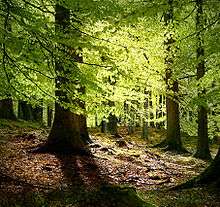Definify.com
Webster 1913 Edition
Forest
For′est
,Noun.
[OF.
forest
, F. forêt
, LL. forestis
, also, forestus
, forestum
, foresta
, prop., open ground reserved for the chase, fr. L. foris
, foras
, out of doors, abroad. See Foreign
.] 1.
An extensive wood; a large tract of land covered with trees; in the United States, a wood of native growth, or a tract of woodland which has never been cultivated.
2.
(Eng. Law)
A large extent or precinct of country, generally waste and woody, belonging to the sovereign, set apart for the keeping of game for his use, not inclosed, but distinguished by certain limits, and protected by certain laws, courts, and officers of its own.
Burrill.
For′est
,Adj.
Of or pertaining to a forest; sylvan.
Forest fly
. (Zool.)
(a)
One of numerous species of blood-sucking flies, of the family
Tabanidæ
, which attack both men and beasts. See Horse fly
. (b)
– Forest glade
, a grassy space in a forest.
Thomson.
– Forest laws
, laws for the protection of game, preservation of timber, etc., in forests.
– Forest tree
, a tree of the forest, especially a timber tree, as distinguished from a
fruit tree
.For′est
,Verb.
T.
To cover with trees or wood.
Webster 1828 Edition
Forest
FOR'EST
,Noun.
1.
An extensive wood, or a large tract of land covered with trees. In America, the word is usually applied to a wood of native growth, or a tract of woodland which has never been cultivated. It differs from wood or woods chiefly in extent. We read of the Hercynian forest, in Germany, and the forest of Ardennes, in France or Gaul.2.
In law, in Great Britain, a certain territory of woody grounds and pastures, privileged for wild beasts and fowls of forest, chase and warren, to rest and abide in, under the protection of the king, for his pleasure. In this sense, the word has no application in America.Forest laws, laws for governing and regulating forests, and preserving game.
FOR'EST
,Verb.
T.
Definition 2026
forest
forest
English
Noun
forest (plural forests)
- A dense collection of trees covering a relatively large area. Larger than woods.
- 2013 June 29, “Unspontaneous combustion”, in The Economist, volume 407, number 8842, page 29:
- Since the mid-1980s, when Indonesia first began to clear its bountiful forests on an industrial scale in favour of lucrative palm-oil plantations, “haze” has become an almost annual occurrence in South-East Asia. The cheapest way to clear logged woodland is to burn it, producing an acrid cloud of foul white smoke that, carried by the wind, can cover hundreds, or even thousands, of square miles.
-
- Any dense collection or amount.
- a forest of criticism
- 1998, Katharine Payne, Silent Thunder: In the Presence of Elephants (page 59)
- Squealing and still propelled by the kick, the calf scrabbled through the forest of legs and into the open.
- (historical) A defined area of land set aside in England as royal hunting ground or for other privileged use; all such areas.
- 2006, Edwin Black, chapter 2, in Internal Combustion:
- Throughout the 1500s, the populace roiled over a constellation of grievances of which the forest emerged as a key focal point. The popular late Middle Ages fictional character Robin Hood, dressed in green to symbolize the forest, dodged fines for forest offenses and stole from the rich to give to the poor. But his appeal was painfully real and embodied the struggle over wood.
- 2013, Alexander Tulloch, The Little Book of Lancashire, The History Press (ISBN 9780752497464)
- [...] in places such as the Forest of Bowland there is hardly a tree in sight and much of the area is a vast tract of almost barren gritstone hills and peat moorland.
-
- (graph theory) A graph with no cycles; i.e., a graph made up of trees.
Hyponyms
- See also Wikisaurus:forest
Meronyms
- tree
- See also Wikisaurus:forest
Derived terms
terms derived from forest (noun)
See also
-
 forest on Wikimedia Commons.Wikimedia Commons
forest on Wikimedia Commons.Wikimedia Commons
Translations
dense collection of trees
|
|
any dense collection
graph theory: union of trees
Verb
forest (third-person singular simple present forests, present participle foresting, simple past and past participle forested)
- (transitive) To cover an area with trees.
Related terms
Translations
to cover an area with trees
|
See also
Anagrams
Middle French
Etymology
From Old French forest, from Medieval Latin foresta (“open wood”), first used in the Capitularies of Charlemagne in reference to the royal forest (as opposed to the inner woods, or parcus).
Noun
forest f (plural forests)
- forest
- 1544, L’Arcadie-Trad-Massin, Paris:
- Mais quand il eut mis fin a ses parolles, & que semblablement les forestz resonnãtes se furent appaisées […]
- But when he had finished talking, and the forests felt appeased […]
- Mais quand il eut mis fin a ses parolles, & que semblablement les forestz resonnãtes se furent appaisées […]
- 1544, L’Arcadie-Trad-Massin, Paris:
Old French
Etymology
From Medieval Latin foresta (“open wood”), first used in the Capitularies of Charlemagne in reference to the royal forest (as opposed to the inner woods, or parcus).
Noun
forest f (oblique plural forez or foretz, nominative singular forest, nominative plural forez or foretz)
Descendants
- English: forest
- Middle French: forest
- French: forêt
